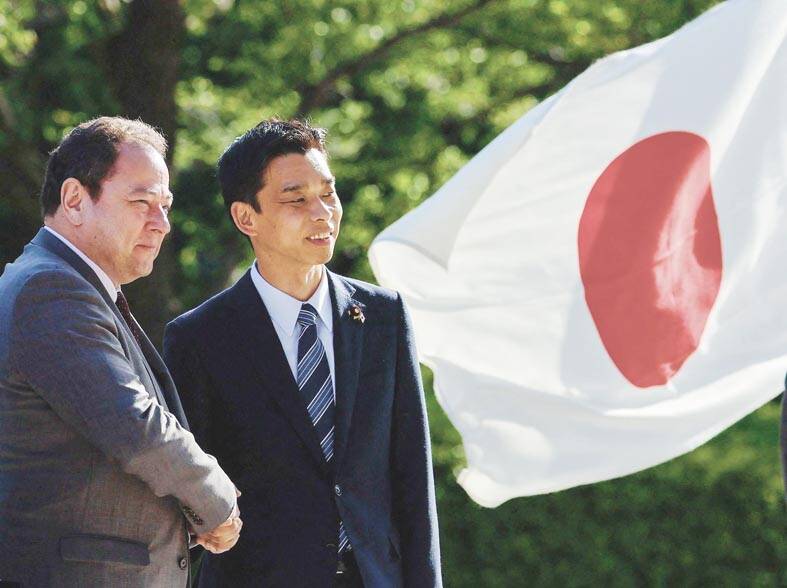Japan would likely come to Taiwan’s aid if China attacks, Japanese State Minister of Defense Toshiro Ino told the Telegraph in an interview published on Sunday.
“If people all over the world have the will to support Taiwan, similar to the way they supported Ukraine when we witnessed Russia’s aggression, then, yes, it would be very possible that we will provide some kind of support to Taiwan,” Ino was quoted as saying
“I am not sure at this juncture whether it is going to be defense equipment support or whether it is going to be logistics support,” he said, adding that it would need the consensus of the Japanese public.

Photo: Reuters
However, Japanese officials are alarmed by the parallels that can be drawn between Russia’s invasion of Ukraine and Beijing’s provocative behavior over Taiwan and in the region’s waters, he said.
Japan has boosted its defense budget by 60 percent over the next five years in response to Beijing’s rapid military build-up under Chinese President Xi Jinping (習近平), Ino said.
“We consider it a threat that China is increasing its military budget and it is sharply increasing its assertiveness in the maritime zones. So far, we have not seen this level of threat before,” he said.
Tokyo has learned from Russian President Vladimir Putin’s disastrous war in Ukraine that it must strengthen its defense capabilities to effectively deter China’s ambitions over Taiwan while focusing on “constructive dialogue” to pre-empt Beijing from escalating, he said.
“We think it is important to demonstrate that it will be difficult to invade Taiwan or make an aggressive move against Taiwan through military means,” Ino said.
If the US is to mount an armed response to a Chinese attempt to take over Taiwan by force, it would almost certainly do so from the various military bases in nearby Japan, he said.
This means Tokyo would have to decide whether to approve Washington’s use of the bases in an active conflict, which might prompt Beijing to attack Japanese territory, Ino said.
Japan would also face the choice of directly joining the fight, in which case Tokyo would seek “maximum support” from allies, including the US and the UK, he said.
“The security environment of the world is becoming the most complicated in its history,” Ino said, referring to the rising belligerence of regional neighbors Russia, China and North Korea.

AIR SUPPORT: The Ministry of National Defense thanked the US for the delivery, adding that it was an indicator of the White House’s commitment to the Taiwan Relations Act Deputy Minister of National Defense Po Horng-huei (柏鴻輝) and Representative to the US Alexander Yui on Friday attended a delivery ceremony for the first of Taiwan’s long-awaited 66 F-16C/D Block 70 jets at a Lockheed Martin Corp factory in Greenville, South Carolina. “We are so proud to be the global home of the F-16 and to support Taiwan’s air defense capabilities,” US Representative William Timmons wrote on X, alongside a photograph of Taiwanese and US officials at the event. The F-16C/D Block 70 jets Taiwan ordered have the same capabilities as aircraft that had been upgraded to F-16Vs. The batch of Lockheed Martin

GRIDLOCK: The National Fire Agency’s Special Search and Rescue team is on standby to travel to the countries to help out with the rescue effort A powerful earthquake rocked Myanmar and neighboring Thailand yesterday, killing at least three people in Bangkok and burying dozens when a high-rise building under construction collapsed. Footage shared on social media from Myanmar’s second-largest city showed widespread destruction, raising fears that many were trapped under the rubble or killed. The magnitude 7.7 earthquake, with an epicenter near Mandalay in Myanmar, struck at midday and was followed by a strong magnitude 6.4 aftershock. The extent of death, injury and destruction — especially in Myanmar, which is embroiled in a civil war and where information is tightly controlled at the best of times —

Taiwan was ranked the fourth-safest country in the world with a score of 82.9, trailing only Andorra, the United Arab Emirates and Qatar in Numbeo’s Safety Index by Country report. Taiwan’s score improved by 0.1 points compared with last year’s mid-year report, which had Taiwan fourth with a score of 82.8. However, both scores were lower than in last year’s first review, when Taiwan scored 83.3, and are a long way from when Taiwan was named the second-safest country in the world in 2021, scoring 84.8. Taiwan ranked higher than Singapore in ninth with a score of 77.4 and Japan in 10th with

SECURITY RISK: If there is a conflict between China and Taiwan, ‘there would likely be significant consequences to global economic and security interests,’ it said China remains the top military and cyber threat to the US and continues to make progress on capabilities to seize Taiwan, a report by US intelligence agencies said on Tuesday. The report provides an overview of the “collective insights” of top US intelligence agencies about the security threats to the US posed by foreign nations and criminal organizations. In its Annual Threat Assessment, the agencies divided threats facing the US into two broad categories, “nonstate transnational criminals and terrorists” and “major state actors,” with China, Russia, Iran and North Korea named. Of those countries, “China presents the most comprehensive and robust military threat